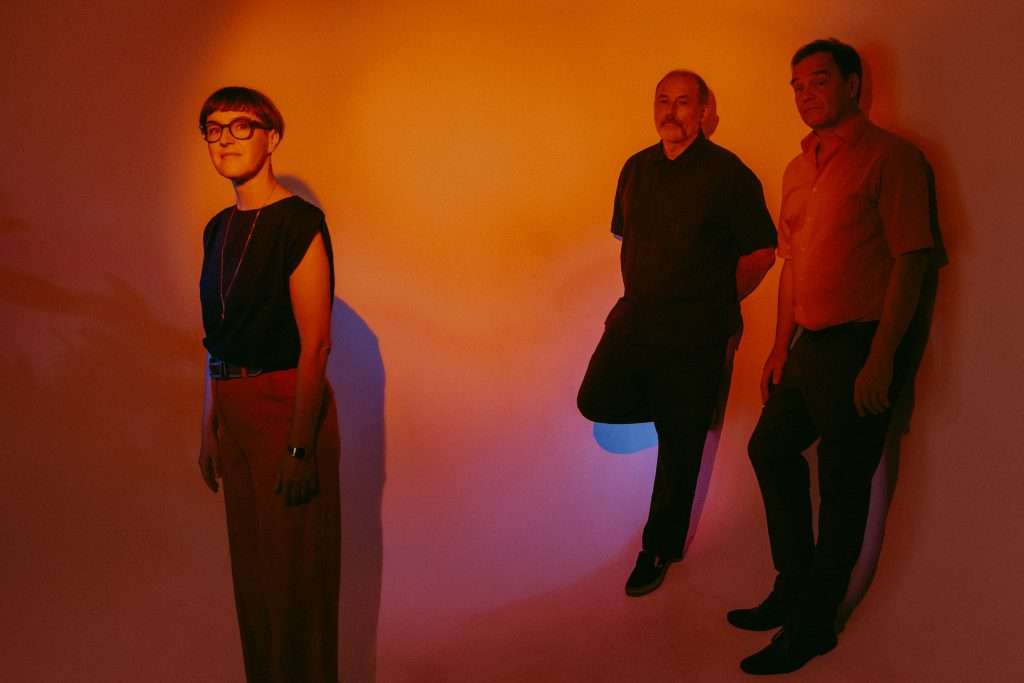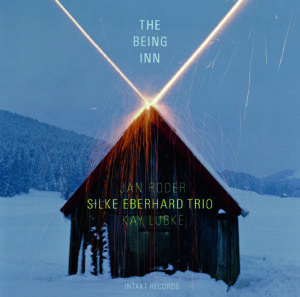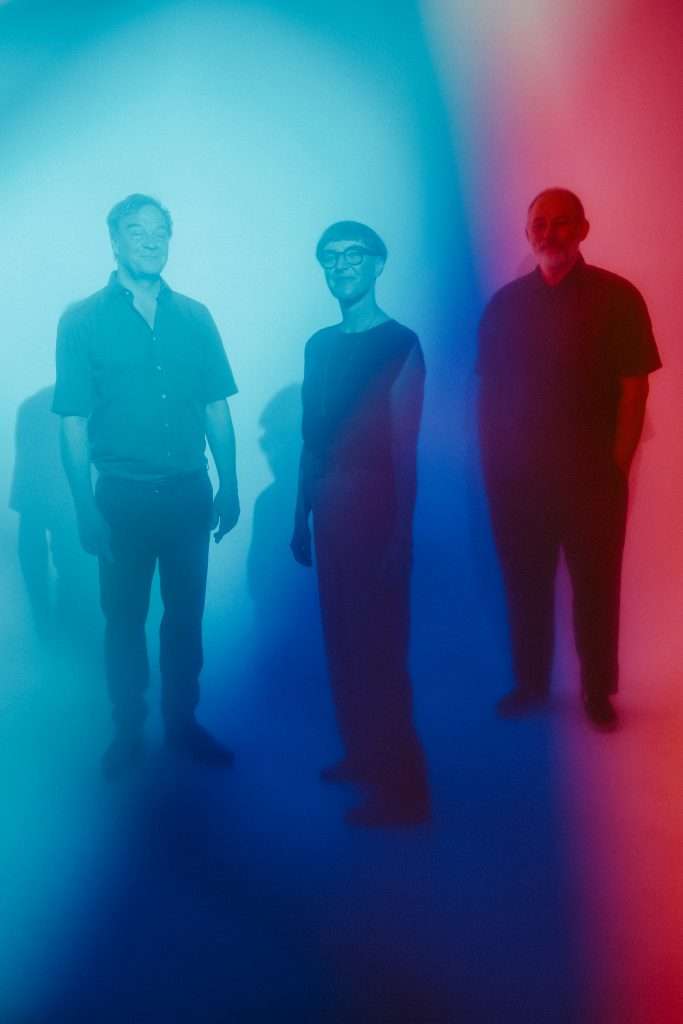“Eberhard also leads a superb trio … In this stellar configuration Eberhard presents her own compositions, flexible and attrictive vehicles rooted in hard-swinging post-bop that nevertheless provide her with great freedom.“ (Downbeat Magazine, Peter Margasak)
 left to right: Silke Eberhard (altosaxophone) / Kay Lübke (drums) / Jan Roder (bass) — (Fotos: Dovile Sermokas)
left to right: Silke Eberhard (altosaxophone) / Kay Lübke (drums) / Jan Roder (bass) — (Fotos: Dovile Sermokas)
Saxophonist, clarinetist and composer Silke Eberhard has been shaping the Berlin jazz scene for many years. Her trio with Jan Roder and Kay Lübke was formed in 2006, with Eberhard‘s history with the two musicians going back to the mid-nineties. The intense relationship between the three can be heard in ev-ery note. The trio moves in the proud tradition of saxophone jazz trios and plays its own, highly original compositions. Their art inspires with musical mastery, improvisational intensity, wit and charm, while forging strong accents through mutual trust and the band‘s particular sound. „The trio play her complex and varied pieces with aplomb and offhand virtuosity. At the same time they capture an explosive, rail-against-the-limits quality“, writes Kevin Whitehead in the liner notes. As on their two pre-vious Intakt releases with the trio Being The Up And Down and The Being Inn, the artwork on the cover was created by Roman Signer, one of the most renowned Swiss artists of our time.

Intakt CD 435 – 2025
“… Her exceptional technique and mastery give her absolute freedom in her playing. From start to finish, her creativity, inventiveness, the way she plays with the difficulties she creates for herself, and her quest for perfection in the grand tradition make her one of the great figures of contemporary jazz, a genre she never ceases to question, explore thoroughly, and turn inside out. There is no weakness, no easy way out, no slackening throughout these ten pieces—nine of which are her own compositions. Her accompanists, Jan Roder and Kay Lübke, are simply impeccable in their roles. That, too, is a certain idea of jazz. An album that flies very high.” (Culture Jazz, France, September 2025
Bird, Monk, Dolphy, vor allem Dolphy. Und die Folgen. Bei Braxton, Roscoe Mitchell, Oliver Lake… Und bei der Leaderin des SILKE EBERHARD TRIOs, die, zusammen mit Jan Roder am Bass, Kay Lübke an Drums und Henry Threadgills Zooid im Hinterkopf, bei Being-a- Ning (Intakt CD 435) den Bebop-Bug im 21. Jh. willkommen heißt. Um Monks ‘Rhythm-a-
Ning’ mit ihrem zentralen Begriff ‘Being’ zu verbinden. Für neue Tänze (‘New Dance’) mit ‘Rubber Boots’, eine ‘Stranger Bossa’, einen Streifzug mit Kratzebogen in ‘Die Urwald II’. ‘Hans im Glück’ tauscht einen ‘Golden Fish’ gegen leere Hände, es genügen die übervoll kreativen Köpfe. Eine so kecke, quicklebendige Form des Seins wie die hier mit dem Altosax gefeierte, in Roders Fingern juckende, mit Stöckchen und Muscheln aufgerührte, aus welchem Forellenbach ist sie gefischt, aus welchem Jungbrunnen gezaubert? Nibbelt man da schon am Cthulhuzän, und der Urwald ist ein Weib? Intervallsprünge, Synkopen, singende und murmelnde Fingerbeeren, kichernde Stöckchen, die Beats ein Klacks, ein hagelnder, knatternder Groove. Jedes Stück ein Wimmelbild aus Schlaraffenland, der Duktus wenn nicht aufgekratzt, dann lakonisch oder versponnen, die Erscheinung veränderlich wie bei ‘nem Octopus. (Bad Alchemy Magazin)

Intakt CD 365 – 2021
Die Triebfeder ihrer Arbeit sieht die Saxofonistin/Komponistin in einem nachhaltigen Umgang im Alltag wie in ihrer Kunst. Immer wieder hat sie sich großen Komplexen gewidmet, wie dem Gesamtwerk Eric Dolphys, für das sie wertvolle Forschungsarbeit geleistet hat. Die Kompositionen für ihr Trioprojekt sind ihren Überlegungen während des Lockdowns in Berlin gewidmet, wie der U-Bahnlinie „U11″, der Weltraumhündin in „Laika’s Descent” oder dem „Zeitlupenbossa”. … (Maxi Bröcking, Fono Forum Magazine)
There is an elusive but audible unity to German alto saxophonist/clarinetist Silke Eberhard. Her approach inhabits a universe equal parts exotic and playful, as if the seriousness pervading it was simultaneously on the point of being dispelled. Each ensemble also speaks to that dualistic unity, referencing Eberhard’s musical past as it intersects with the historical narratives she has done so much to champion. … (The New York City Jazz Record)

Intakt CD 280 – 2017
PREIS DER DEUTSCHEN SCHALLPLATTENKRITIK – GERMAN RECORD CRITICS AWARD (2017/4)
Jurymitglied Bert Noglik schreibt in der Begründung: “Das Album gleicht einer Einladung in das imaginäre Gasthaus, das sich die Berliner Altsaxophonistin und Bassklarinettistin Silke Eberhard beim Schreiben der Stücke vorstellte – ein Ort, an dem die moderne Jazztradition im Raum schwebt und im gemeinschaftlichen Spiel neu ausgeformt wird. Dabei sind die Fenster weit geöffnet, so dass sich bei allen Reminiszenzen an die Geschichte dieser Musik ein beglückendes Gefühl von Freiheit einstellt. Jan Roder am Kontrabass und Kay Lübke am Schlagzeug weben ein spannendes Beziehungsgeflecht und treten als Gesprächspartner der Bandleaderin wie auch selbst als Solisten hervor, so dass ein vielfältig ausdifferenzierter Trioklang entsteht, der sehr eigen ist und zugleich vertraut anmutet.”
“Beaucoup plus aéré est le disque d’un second trio sax-contrebasse-batterie, celui de la saxophoniste allemande Silke Eberhard (saxo-alto et clarinette basse), fort bien accompagnée par Jan Roder et Kay Lübke. Son jeu, sinueux, son attaque franche, et son travail sur les intervalles renvoient un peu à Eric Dolphy, à Steve Lacy également, et peut-être à Arthur Blythe car elle navigue sur des thèmes et des structures rythmiques assez simples, mais parfaits pour susciter l’improvisation. Une suite de 18’, sept pièces qui n’atteignent pas 6’, et cinq… “(Cultur Jazz Magazine)
ONE OF 10 BEST JAZZ ALBUMS IN 2017 – BERLINGSKE/DENMARK

It’s no secret that reedist Silke Eberhard is a keen student of jazz history, a player whose inspiration routinely gets rechar- ged by immersing herself in the music of her early heroes. For her that means more than listening to old records by the likes of Eric Dolphy, Charles Mingus, and Ornette Coleman (the subject of Eberhard’s 2007 Intakt debut, a duo album with pia- nist Aki Takase titled Ornette Coleman Anthology) – but diving into that repertoire and reshaping it with novel instrumentation.
But Eberhard makes it clear that the trio featured on The Being Inn is the context for which she always imagines her own material. “I feel a lot of freedom with this group,” she says of working with bassist Jan Roder and drummer Kay Lübke. Although this particular group coalesced in 2006, her history with each player stretches back to the mid-90s and there’s no missing the rapport they’ve all developed together.
Eberhard and company make a conceptual leap on the album, with many of the pieces tied to the titular concept – an imaginary inn the saxophonist pictured as she composed numerous tunes. She jokes that the spry opening track, “Ding Dong,” is the kind of number she likes to open one of the trio’s sets with – “a door bell,” she calls it, although the first sounds we actually here are her footsteps leading toward a door that soon opens, inviting the listener in.
(Peter Margasak, from the liner notes)

(Foto: Rüdiger Kusserow)
